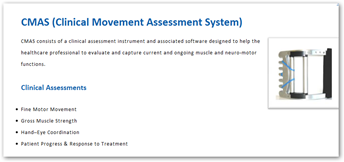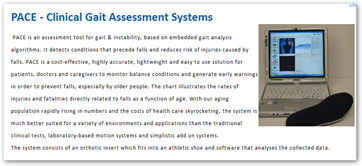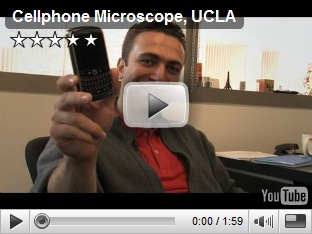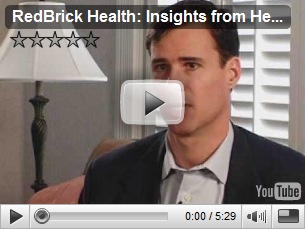MediSens has a few different areas of investigation going on at UCLA, and the CMAS product is the one receiving FDA approval. You can read more at the site about the device that gathers information. This device reports data back to a computer and can be used to evaluate post surgical outcomes relating to head and spinal cord injuries. When we talk about meaningful use and data, devices can’t be left out of the circle. Diabetes monitoring is another key target area with the reporting system. It will determine if a diabetic individual is developing and/or monitoring peripheral neuropathies.
MediSens also has a couple other interesting products they are working with – Medication Compliance for one. Your phone is going to be a reminder and text messaging system, we all know this stuff is coming. I have posted about all types of such devices from a blue tooth inhaler to a medication bottle that goes on a network with it’s own IP address to help you out. Yikes! How much can one take!
They also have a “Gait” system that works with your show, yup you heard that one right, a chip off the old heel you could say. It produces a lot of data and that can be billed and used for reimbursement. All of this is wireless blue tooth as well.
Now we need to make sure these folks are working with these other folks at UCLA, to see how much of this we can stand and deal with.
Are Cell Phones Enabling anyone to be a Scientist or Doctor - Participatory Sensing from CENS at UCLA
We have a new buzz word for this now, “participatory sensing” from the halls of UCLA. I think at this time this might be a good idea to roll this right up into the “meaningful use” discussions going on. They do go hand in hand. We need to evaluate and make sure we can handle this as every wellness program, especially those with employers is going to want to electronically hook you up as a patient.
Just look at how a cell phone disrupts us already, so proper and non disruptive technologies and implementations are needed so devices are not just dumped out to consumers and doctors from companies who may have limited venture capital funds and need the money to stay in business before the VC money goes dry. That is kind of a downside VC funding in healthcare and some of those companies do luck out and have major device companies buy them up and thus take some of the pressure off of having to answer to investors about their sales and how many products have been placed in the market. When dollars talk they don’t really think or care about how the devices are being use and levels of accuracy.
This is exactly what we are facing today in healthcare with funding and cutting costs, so read up on everything you can and hopefully we will have some good useful technology for better health care if the rush for greed and profits stay out of the way.
I have been talking about this for about 2 years here on the blog about this type of technology and where it is headed and here we go, just as predicted.
Here’s a video that explains a bit more about what is going on at the California NanoSystems Institute, interesting and again have posted a lot of this stuff on the blog over the last couple years too.
Health insurance is getting into this too with biometric statistics to allow for behavioral underwriting too, the scary part where the potential is there to use against you if your behavior is not perfect. Some companies are already doing this. The video below from Red Brick Insurance, who is a big customer of Ingenix, a wholly own subsidiary of United Healthcare explains their angle. This is one of the reasons I believe health insurance should go back to being non profit as they can’t enough data and will figure every way they can to make buck off of and expand the big dollars we pay for healthcare, it comes out of our pockets.
Behavioral Underwriting With Biometric Employee Screenings – Red Brick Secures 3 More Clients
If part of this post has not made you feel uneasy or disconnected, then I’m not doing my job with reporting all of this to bring around an awareness that we are on the verge of Start Wars medicine so I hope to again bring this around to where everyone knows what is working in healthcare technology with devices that report data, as our Congress does not appear to participate and any laws created don’t seem to be addressing our privacy in these areas either. BD
(PhysOrg.com) -- MediSens Wireless, a startup company in UCLA's on-campus technology incubator at the California NanoSystems Institute, has obtained
approval under federal Food and Drug Administration guidelines to begin clinical trials on its novel wireless body-monitoring system, which assesses muscle and neuromotor functions in the upper extremities.
he Clinical Movement Assessment System (CMAS) is designed for a wide variety of medical applications and could potentially benefit health care professionals and facilities specializing in the areas of physical medicine and rehabilitation, neurology, orthopedics, and physical and occupational therapy, among others.
"The data gathered by our monitoring system, CMAS, has the potential to enable health care professionals to improve care through early intervention and better tracking of outcomes and response to treatment," said Dr. Jay Rindenau, M.D., the company's chief medical officer.
UCLA Startup to begin clinical trials for wireless body-monitoring system
Related Reading:
The Medical Quack: Participatory Sensing with Cell Phones – New ...
White House Speaks About Wireless Technology – Healthcare And ...
participatory sensing – medical devices reporting data for patient ...
Behavioral Underwriting With Biometric Employee Screenings – Red ...
Wellpoint Enters Contract Agreement with Red Brick for Behavioral Underwriting








0 comments :
Post a Comment